儿童语言习得
儿童心理发展中的语言习得从咿呀学语到复杂表达

儿童心理发展中的语言习得从咿呀学语到复杂表达儿童的语言习得是他们心理发展中的重要一环。
从咿呀学语到复杂的表达,儿童经历了一个逐渐成长的过程。
本文将探讨儿童心理发展中语言习得的几个关键阶段,以及如何促进和支持他们的语言能力提升。
一、咿呀学语:语言启蒙的第一步在儿童的最早期,从出生到一岁左右,他们开始发出咿呀声和吐字母的声音。
这是他们迈向语言习得的第一步。
咿呀学语的阶段是儿童学习语言的启蒙期,他们试图模仿成人的语音和表达方式。
此阶段儿童对于语音的区分能力开始发展,并通过观察和模仿身边的成人来学习语言。
家长和其他照顾者在这个阶段的关键角色是提供良好的语言环境。
与儿童进行互动,多与他们进行对话,用简单而生动的语言描述他们的周围环境,给予积极的反馈和鼓励,都有助于促进儿童的语言发展。
二、词汇和语法的习得:向复杂语言发展迈进随着儿童逐渐成长,他们开始学习掌握单词和构建简单的语法规则。
这个阶段大约发生在一岁到三岁之间。
儿童通过与周围的环境进行交互,不断增加他们的词汇量,并学会将这些词组合成简单的句子。
家长可以通过多与儿童交流,提供语言模型,引导他们正确使用语法规则。
给予儿童与之相应的回应,帮助他们理解和纠正语法错误,都有助于促进他们的语言习得。
三、语言运用的进阶:掌握复杂表达和沟通技巧当儿童逐渐掌握了基本的语言技能后,他们开始朝着更高级的语言运用迈进。
在这个阶段,约为三岁到六岁之间,儿童能够使用更加复杂的句子结构和语言表达方式。
他们开始能够描述和解释更加复杂的概念,并参与到更加深入的对话和讨论中。
在这个阶段,家庭和教育环境对于儿童的语言发展尤为重要。
给予他们更多的语言机会,鼓励他们参与到各种语言活动中,如朗读、讨论、讲故事等,有助于儿童的语言能力提升。
提供丰富的语言输入和鼓励他们表达自己的观点和感受,也能促进他们的语言发展。
四、培养良好阅读习惯:语言习得的推动力阅读在儿童的语言发展中扮演着至关重要的角色。
通过阅读和倾听故事,儿童能够拓展他们的词汇量、语法结构以及扩展他们对语言的理解能力。
幼儿园语言教育:儿童语言习得基础知识

幼儿园语言教育:儿童语言习得基础知识在幼儿园阶段,语言教育扮演着至关重要的角色,因为这是儿童习得语言的关键时期。
儿童在幼儿园时期开始接触语言,建立起对语言的基本认知能力。
他们在这个阶段习得的语言技能将对其未来的学习和人际交往产生深远的影响。
幼儿园语言教育需要针对儿童的语言习得基础知识展开全面而系统的探讨。
1. 语言习得理论在幼儿园语言教育中,了解语言习得的理论对教学实践具有重要意义。
普遍儿童语言习得理论认为,儿童通过模仿、接触和积极参与社交互动来习得语言。
而课堂教学应该注重提供真实、有意义的语言环境,鼓励孩子尝试使用语言,促进他们的语言习得。
2. 语言发展阶段儿童的语言发展经历了听、说、读、写的阶段,幼儿园语言教育需要根据不同阶段的语言发展特点来进行教学设计。
在幼儿园阶段,儿童主要通过模仿和重复来学习口语表达,因此教师需要创设丰富的语言环境,提供大量的语言输入,帮助儿童建立起正确的语音、词汇和语法基础。
3. 语言教学方法在幼儿园语言教育中,适合儿童认知和发展水平的教学方法至关重要。
可以采用游戏、歌曲、故事等丰富多彩的活动,激发儿童学习语言的兴趣,帮助他们在轻松愉快的氛围中习得语言。
要注重口语表达能力的培养,鼓励儿童多参与口语交流活动,提高他们的语言运用能力。
4. 家校合作幼儿园语言教育不仅需要学校的努力,家庭的参与也至关重要。
家长可以在家中为孩子创设语言学习环境,与教师密切合作,共同关注孩子的语言发展情况。
这样的家校合作能够为孩子的语言习得提供更多的支持和帮助,促进他们全面发展。
从语言习得理论、语言发展阶段、语言教学方法和家校合作等方面来看,幼儿园语言教育是一个涉及多个方面的复杂系统工程。
在这个过程中,教师需要有深厚的专业知识和丰富的教学经验,同时需要不断提升自己的教育教学理念,不断完善自己的教学方法,以更好地满足儿童语言习得的需求。
幼儿园语言教育既是一门科学,又是一门艺术。
通过对儿童语言习得基础知识的深入探讨和领悟,教师们可以更好地引导和促进儿童的语言习得,让他们在轻松愉快的氛围中健康快乐地成长。
语言习得研究儿童语言习得过程及其影响因素

语言习得研究儿童语言习得过程及其影响因素语言习得研究——儿童语言习得过程及其影响因素语言习得是指人们通过自然环境与社会互动逐步掌握和应用语言的过程。
对于儿童来说,语言习得是他们认识世界、表达情感、交流思想的基本工具。
本文将探讨儿童语言习得的过程及其影响因素。
一、儿童语言习得的过程儿童语言习得的过程分为听说读写四个阶段,每个阶段都有其特点和重点。
1. 听阶段在婴儿期至幼儿期初期,儿童通过倾听周围的语言环境来感知和吸收语言。
他们会注意并模仿成人的语音声调和基本表达方式。
同时,对于他们来说,辨别和理解语音的能力是发展的重点。
2. 说阶段一旦儿童掌握了听能力,他们开始尝试使用语言进行表达和沟通。
这个阶段的儿童常常会使用简单的词汇和短语来表达自己的意图。
他们通过与他人的互动,逐渐提高自己的语音流利度和语法正确性。
3. 读阶段随着时间的推移,儿童开始阅读字母和单词。
这个阶段要求儿童理解和识别书写的能力,同时也需要他们将书写和语言联系起来。
儿童通过阅读扩大自己的词汇量,并更好地理解语言的规则和结构。
4. 写阶段在儿童已经初步掌握读的基础上,他们开始学习书写字母和单词。
写作是儿童语言习得的最后一步,他们通过书写来表达自己的思想和观点。
写作能力的提高需要大量的练习和反馈。
二、儿童语言习得的影响因素儿童语言习得的过程受到多种因素的影响,以下是一些关键的影响因素。
1. 社会环境儿童成长的社会环境对他们的语言习得起到重要作用。
语言输入的质量和数量,以及家庭和学校的支持和鼓励,会影响儿童语言能力的发展。
在一个富有语言环境的家庭和社区中成长的儿童更容易学习和掌握语言。
2. 个体差异每个孩子在语言习得过程中的进展和方式都有所不同。
个体差异包括儿童的天赋、认知和社交能力等方面。
有些儿童可能在某个语言方面表现得更好,而在其他方面则相对较弱。
因此,了解每个儿童的差异并提供个性化的教学和支持非常重要。
3. 教育和教学方法有效的教育和教学方法对于儿童语言习得的发展至关重要。
发展心理学中的儿童语言习得
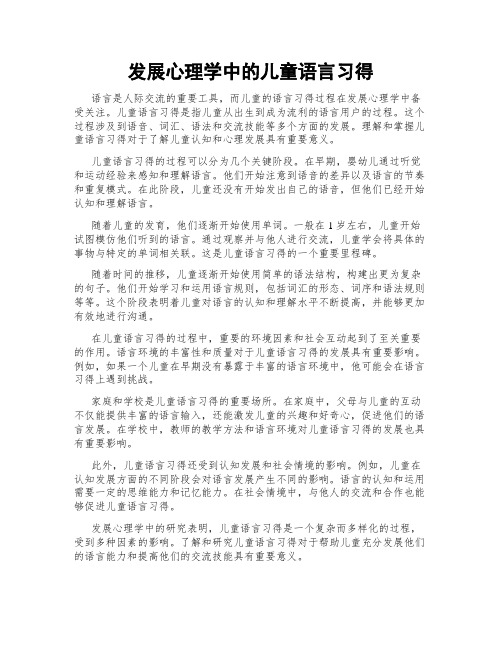
发展心理学中的儿童语言习得语言是人际交流的重要工具,而儿童的语言习得过程在发展心理学中备受关注。
儿童语言习得是指儿童从出生到成为流利的语言用户的过程。
这个过程涉及到语音、词汇、语法和交流技能等多个方面的发展。
理解和掌握儿童语言习得对于了解儿童认知和心理发展具有重要意义。
儿童语言习得的过程可以分为几个关键阶段。
在早期,婴幼儿通过听觉和运动经验来感知和理解语言。
他们开始注意到语音的差异以及语言的节奏和重复模式。
在此阶段,儿童还没有开始发出自己的语音,但他们已经开始认知和理解语言。
随着儿童的发育,他们逐渐开始使用单词。
一般在1岁左右,儿童开始试图模仿他们听到的语言。
通过观察并与他人进行交流,儿童学会将具体的事物与特定的单词相关联。
这是儿童语言习得的一个重要里程碑。
随着时间的推移,儿童逐渐开始使用简单的语法结构,构建出更为复杂的句子。
他们开始学习和运用语言规则,包括词汇的形态、词序和语法规则等等。
这个阶段表明着儿童对语言的认知和理解水平不断提高,并能够更加有效地进行沟通。
在儿童语言习得的过程中,重要的环境因素和社会互动起到了至关重要的作用。
语言环境的丰富性和质量对于儿童语言习得的发展具有重要影响。
例如,如果一个儿童在早期没有暴露于丰富的语言环境中,他可能会在语言习得上遇到挑战。
家庭和学校是儿童语言习得的重要场所。
在家庭中,父母与儿童的互动不仅能提供丰富的语言输入,还能激发儿童的兴趣和好奇心,促进他们的语言发展。
在学校中,教师的教学方法和语言环境对儿童语言习得的发展也具有重要影响。
此外,儿童语言习得还受到认知发展和社会情境的影响。
例如,儿童在认知发展方面的不同阶段会对语言发展产生不同的影响。
语言的认知和运用需要一定的思维能力和记忆能力。
在社会情境中,与他人的交流和合作也能够促进儿童语言习得。
发展心理学中的研究表明,儿童语言习得是一个复杂而多样化的过程,受到多种因素的影响。
了解和研究儿童语言习得对于帮助儿童充分发展他们的语言能力和提高他们的交流技能具有重要意义。
探索中班儿童的语言习得过程

探索中班儿童的语言习得过程语言习得对于儿童的成长和发展具有重要的影响,中班是儿童语言发展的关键阶段。
在这个阶段,儿童开始从简单的单词和短语逐渐进入到更为复杂的语言表达。
本文将探索中班儿童的语言习得过程,并分析其影响因素。
一、语言习得的定义和重要性语言习得是指儿童在成长过程中通过接触语言环境,并通过观察、模仿和实践等方式,逐步掌握和应用语言的过程。
语言习得与儿童的认知、情感和社会发展密切相关,对儿童的智力、社交能力和学习能力等方面都有深远的影响。
二、中班儿童语言习得的特点1. 词汇量的快速增长:中班儿童在这个阶段词汇量迅速增长,从最初的几百个词汇到一千个以上。
2. 语法结构的逐步规范:中班儿童开始学习和应用复杂的语法结构,能够正确运用时态、单复数和格的概念。
3. 语言表达的多样性:中班儿童能够用完整的句子来表达自己的意思,同时也能够运用修辞手法来增强语言的表达效果。
4. 语音及语调的改进:中班儿童的语音发音更加准确,语调更加自然,能够模仿和运用不同的语音语调进行表达。
三、中班儿童语言习得的影响因素1. 家庭环境:儿童在家庭中的语言输入对其语言习得起到重要的影响。
家长应提供丰富的语言环境,与孩子进行互动交流,鼓励和支持孩子的语言表达。
2. 学前教育:幼儿园作为儿童语言发展的重要场所,提供了良好的语言学习环境。
教师应该关注每个孩子的语言习得进程,针对孩子的不同需求提供相应的支持和指导。
3. 社交交往:儿童通过与同伴及其他人的交往,拓展了语言使用的机会,并学习到不同语境下的语言应用方式。
4. 个体差异:每个儿童的语言习得速度和能力都不尽相同。
教师和家长应根据每个孩子的差异制定个性化的语言支持计划。
四、促进中班儿童语言习得的方法1. 提供丰富的语言环境:创设与实际生活相关的语言环境,提供丰富多样的语言材料,激发儿童的语言兴趣。
2. 提供积极的语言激励和反馈:鼓励儿童参与语言表达,并给予积极的反馈和肯定,增强他们的语言自信心。
儿童语言习得的研究与实践
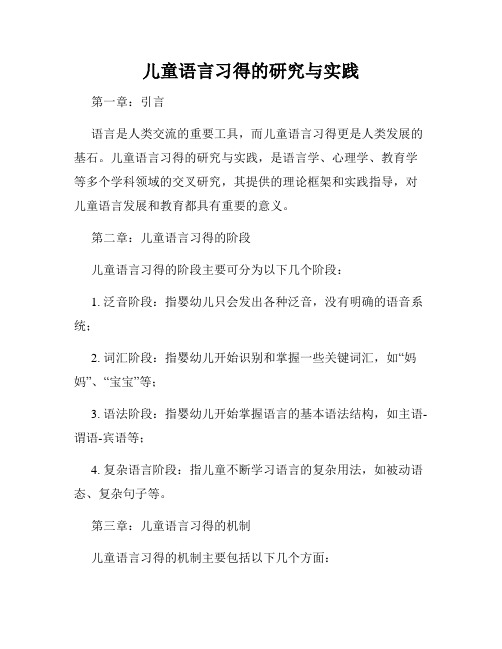
儿童语言习得的研究与实践第一章:引言语言是人类交流的重要工具,而儿童语言习得更是人类发展的基石。
儿童语言习得的研究与实践,是语言学、心理学、教育学等多个学科领域的交叉研究,其提供的理论框架和实践指导,对儿童语言发展和教育都具有重要的意义。
第二章:儿童语言习得的阶段儿童语言习得的阶段主要可分为以下几个阶段:1. 泛音阶段:指婴幼儿只会发出各种泛音,没有明确的语音系统;2. 词汇阶段:指婴幼儿开始识别和掌握一些关键词汇,如“妈妈”、“宝宝”等;3. 语法阶段:指婴幼儿开始掌握语言的基本语法结构,如主语-谓语-宾语等;4. 复杂语言阶段:指儿童不断学习语言的复杂用法,如被动语态、复杂句子等。
第三章:儿童语言习得的机制儿童语言习得的机制主要包括以下几个方面:1. 先天因素:指婴幼儿天生就有语言习得的能力和倾向,如在听觉敏感期内识别语言声音;2. 环境因素:指婴幼儿周围的语言环境对语言习得的影响,如家庭、幼儿园等;3. 社会因素:指文化、社会等因素对语言习得的影响,如不同国家和地区的语言发展差异;4. 学习因素:指儿童在语言习得中通过学习获得新的语言知识和技能。
第四章:儿童语言习得的实践儿童语言习得的实践主要包括以下几个方面:1. 早期教育:指对婴幼儿进行语言刺激和教育,如通过听、说、读、写等方式促进儿童语言发展;2. 语言治疗:指对儿童语言发展缺陷进行治疗,如对说话迟缓、发音困难、语法错误等问题进行矫正;3. 语言训练:指对儿童进行语音、语法、词汇的训练,以提高儿童的语言能力;4. 多语言教育:指在多语言背景下对儿童进行语言教育,以便让其掌握多种语言,具有更广阔的文化视野和交际能力。
第五章:结论儿童语言习得是复杂而有趣的过程,涉及多个学科领域和实践经验。
通过深入研究和探索,可以更好地促进儿童语言发展,提高其语言能力和社交能力,为将来的发展打下良好的基础。
语言习得理论

先天论的观点得到了美国心理学家伦尼伯 格的支持。他在1967年所著的《语言的生物学 基础》一书中,提出了衡量某种行为是否基于 遗传的六项标准: 这种行为在需要之前就出现了; 它的出现不是主观决定的结果; 它的出现不是靠外部原因激发的; 获得这种行为往往有个关键期; 直接教授和训练对这种行为的获得影响很小;
② 相互作用论不是把语言本身看成是先天的
产物,而是在非语言的认知基础上构造出 来的,强调的是认知结构的动态的建构过 程,这一过程也适用于语言的获得。这对 于个体自发能动地获得语言成分、总结归 纳语言规则,创造性地建构话语做了合理 的解释。同时这种建构的能动性不是无限 地发挥,而是和认知发展有相互制约的关 系,因此表现为语言习得中的阶段性和顺 序,这些解释都是很有说服力的。
此外, 先天论还从儿童习得语言的顺序性和 阶段性来强调说明语言能力是天生的,不是 强化和归纳的结果。另外语言习得关键期的 存在也具备先天的基础,有赖于遗传控制的 生理基础。
先天论并不完全否认后天语言环境的作 用,但把语言环境的作用看得非常小,只是 起着激发LAD工作的作用,是第二性的。
总之先天论把儿童获得语言描绘为积极 主动,充满创造性的过程,儿童获得的不是 一句、一句的具体话语,而是关于语言的一 系列规则。
⑤ 家庭和幼儿园语言环境的好坏直接影响儿童的语言 水平(缺乏语言交际环境的儿童,语言发展的进程 要比正常儿童推迟一年多)。
2)刺激—反应论的不足:
① 言语行为十分复杂,既有可观察可测量的外部因素, 也很多难于观察、测量心理因素,不同于一般的动物 行为,不能只用“刺激-反应”来解释。外因论他们只 承认言语行为,不承认有复杂的符号系统的存在,把 言支配,把言语行为简单地等同 于其他行为,甚至等同于动物的行为,将动物的实验 结果简单地推广到儿童的语言学习中,强调刺激与反 应在直接情境中的固定的、机械的联系,否定了人的 语言潜能和言语行为的特殊性,否定大脑加工外部信 息的能动性,把主体当作被动消极的语言训练对象, 这不符合儿童习得语言的基本事实,因而不能解释实 际存在的许多问题。
浅谈儿童语言习得与语言发展的影响因素

浅谈儿童语言习得与语言发展的影响因素儿童语言习得是指儿童在成长过程中通过与周围环境的交互主动学习和掌握语言的过程,而语言发展则是指儿童在语言习得过程中逐渐掌握语言能力和表达能力的发展。
影响儿童语言习得的因素有很多,主要包括以下几个方面:1. 基因因素:儿童的基因对于语言习得起到了重要的影响。
有些研究表明,儿童的基因可以影响他们对语音的敏感性、词汇的吸收能力、语法的掌握能力等方面。
不同儿童的基因差异可能导致他们在语言习得方面的差异。
2. 环境因素:儿童成长的环境对于语言习得起到了重要的影响。
儿童从出生开始就会接触到各种不同的环境刺激,包括父母的语言输入、家庭的语言环境、托儿所或幼儿园的语言教育等。
这些环境刺激对于儿童的语言习得起到了重要的推动作用。
3. 社会文化因素:社会文化对儿童语言习得也起到了重要的影响。
儿童所处的社会文化背景会影响他们对语言的使用和理解方式。
不同的语言社区和文化背景会给儿童提供不同的语言输入和交流机会,从而影响他们的语言习得。
4. 认知因素:儿童的认知能力对于语言习得也起到了重要的影响。
儿童在习得语言的过程中需要通过观察、记忆和思考来理解和运用语言。
他们的认知能力包括注意力、记忆、思维等方面,这些能力会影响他们对语言的理解和掌握能力。
5. 情感因素:儿童的情感状态对于语言习得也有一定的影响。
愉快的情感可以促进儿童对语言的积极接受和学习,而负面的情感则可能阻碍儿童的语言习得过程。
儿童在与他人的交流中会产生情感反应,这些情感反应会影响他们对语言的态度和使用。
儿童语言习得和语言发展是一个复杂而多方面的过程,受到许多因素的影响。
基因、环境、社会文化、认知和情感等因素相互作用,共同影响着儿童对语言的习得和发展。
了解这些影响因素,可以帮助家长和教育者提供适宜的语言环境和教育方式,促进儿童的语言习得和发展。
浅谈儿童语言习得与语言发展的影响因素
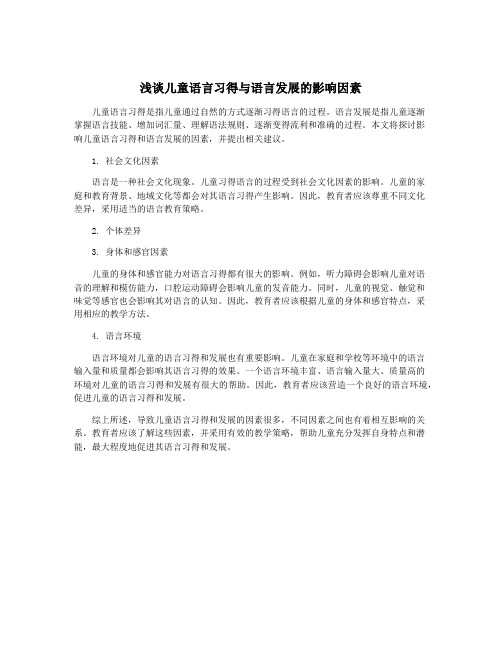
浅谈儿童语言习得与语言发展的影响因素
儿童语言习得是指儿童通过自然的方式逐渐习得语言的过程。
语言发展是指儿童逐渐
掌握语言技能、增加词汇量、理解语法规则、逐渐变得流利和准确的过程。
本文将探讨影
响儿童语言习得和语言发展的因素,并提出相关建议。
1. 社会文化因素
语言是一种社会文化现象。
儿童习得语言的过程受到社会文化因素的影响。
儿童的家
庭和教育背景、地域文化等都会对其语言习得产生影响。
因此,教育者应该尊重不同文化
差异,采用适当的语言教育策略。
2. 个体差异
3. 身体和感官因素
儿童的身体和感官能力对语言习得都有很大的影响。
例如,听力障碍会影响儿童对语
音的理解和模仿能力,口腔运动障碍会影响儿童的发音能力。
同时,儿童的视觉、触觉和
味觉等感官也会影响其对语言的认知。
因此,教育者应该根据儿童的身体和感官特点,采
用相应的教学方法。
4. 语言环境
语言环境对儿童的语言习得和发展也有重要影响。
儿童在家庭和学校等环境中的语言
输入量和质量都会影响其语言习得的效果。
一个语言环境丰富、语言输入量大、质量高的
环境对儿童的语言习得和发展有很大的帮助。
因此,教育者应该营造一个良好的语言环境,促进儿童的语言习得和发展。
综上所述,导致儿童语言习得和发展的因素很多,不同因素之间也有着相互影响的关系。
教育者应该了解这些因素,并采用有效的教学策略,帮助儿童充分发挥自身特点和潜能,最大程度地促进其语言习得和发展。
第十章 语言习得
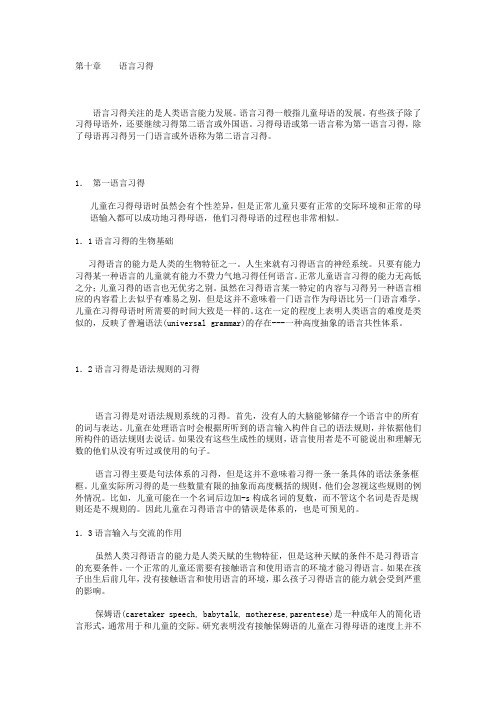
第十章语言习得语言习得关注的是人类语言能力发展。
语言习得一般指儿童母语的发展。
有些孩子除了习得母语外,还要继续习得第二语言或外国语。
习得母语或第一语言称为第一语言习得,除了母语再习得另一门语言或外语称为第二语言习得。
1.第一语言习得儿童在习得母语时虽然会有个性差异,但是正常儿童只要有正常的交际环境和正常的母语输入都可以成功地习得母语,他们习得母语的过程也非常相似。
1.1语言习得的生物基础习得语言的能力是人类的生物特征之一。
人生来就有习得语言的神经系统。
只要有能力习得某一种语言的儿童就有能力不费力气地习得任何语言。
正常儿童语言习得的能力无高低之分;儿童习得的语言也无优劣之别。
虽然在习得语言某一特定的内容与习得另一种语言相应的内容看上去似乎有难易之别,但是这并不意味着一门语言作为母语比另一门语言难学。
儿童在习得母语时所需要的时间大致是一样的。
这在一定的程度上表明人类语言的难度是类似的,反映了普遍语法(universal grammar)的存在---一种高度抽象的语言共性体系。
1.2语言习得是语法规则的习得语言习得是对语法规则系统的习得。
首先,没有人的大脑能够储存一个语言中的所有的词与表达。
儿童在处理语言时会根据所听到的语言输入构件自己的语法规则,并依据他们所构件的语法规则去说话。
如果没有这些生成性的规则,语言使用者是不可能说出和理解无数的他们从没有听过或使用的句子。
语言习得主要是句法体系的习得,但是这并不意味着习得一条一条具体的语法条条框框。
儿童实际所习得的是一些数量有限的抽象而高度概括的规则,他们会忽视这些规则的例外情况。
比如,儿童可能在一个名词后边加-s构成名词的复数,而不管这个名词是否是规则还是不规则的。
因此儿童在习得语言中的错误是体系的,也是可预见的。
1.3语言输入与交流的作用虽然人类习得语言的能力是人类天赋的生物特征,但是这种天赋的条件不是习得语言的充要条件。
一个正常的儿童还需要有接触语言和使用语言的环境才能习得语言。
儿童语言习得的心理过程

儿童语言习得的心理过程儿童语言习得是一个复杂而令人惊叹的心理过程。
在这个过程中,儿童从无语言能力到能流利地使用语言进行表达和交流的能力,需要经历多个阶段。
本文将探讨儿童语言习得的心理过程,并分析其中的关键因素。
一、前期语言准备阶段在儿童出生之前的几个月,他们已经开始接触到语言的声音和节奏。
通过听妈妈的呢喃声、家庭成员的对话和周围的环境噪音,儿童开始对语言产生了兴趣。
这个阶段可以说是儿童语言习得的基础,为后续的语言发展奠定了基础。
二、单词和词汇的习得在儿童大约一岁半到两岁时,他们开始发展出对单词的理解与使用能力。
这是他们掌握语言的重要里程碑,也是从“牙牙学语”到“口齿伶俐”的转变。
在这个阶段,儿童通过家长和周围环境的指导,学会了一些基本的单词,如妈妈、爸爸、水等,同时也能理解这些单词的含义。
因为单词的记忆和使用相对简单,所以这个阶段的语言习得进展较快。
三、语法与句子结构的理解在掌握了一定数量的单词后,儿童开始思考如何合理地组合这些单词。
他们开始观察和模仿周围人的语言表达方式,并逐渐理解语法规则和句子结构。
在这个阶段,儿童会出现一些典型的语法错误,如过度使用动词时态、错误的主谓一致等。
这是因为他们正在努力理解和应用语言规则,需要持续的练习和纠正。
四、语言运用能力的提升当儿童逐渐掌握了基本的语法结构和单词表达后,他们开始加强对语言的运用能力。
他们开始构建更复杂的句子,表达更具体的意思。
例如,描述自己的感受、分享自己的经历等。
这个阶段的语言习得是一个渐进的过程,需要通过大量的语言输入和多次的实践来提高语言运用的准确性和流利度。
五、语言的外化与自我表达能力随着儿童语言习得的不断深入,他们开始能够更好地利用语言来表达自己的思想和情感。
他们逐渐具备了故事叙述和描述的能力,并且能够运用语言来解决问题和与他人进行有效的交流。
在这个阶段,语言已不再是简单的工具,而是儿童个体思维和社交互动的载体。
六、语言的精炼和完善儿童语言习得过程中最后一个阶段是对语言进行细化和完善。
儿童语言的习得

儿童语言的习得覃卫红摘要:儿童语言的习得简言之就是儿童学习语言的过程..对于这个问题很早就有人研究;也有很多人研究;语言是一个复杂的东西;而儿童对于母语的理解和获得的速度却让人难以想象..一般的正常儿童在出生后四五年内能够在未经任何正式训练的情况下顺利的获得听、说母语的能力..在这篇文章中;我想重点探讨一下儿童语言究竟有怎样的特点;而这些特点又是如何帮助儿童来更好的习得一门语言;在习得语言的时候儿童也会出现一些独特的心理特征;这些心理特征对语言特点语言习得也有一定的影响..一、儿童语言的特点研究1、语音特点:重复在小孩子学习语言的时候;特点最突出的当属重复;很多小孩子最早会说的无外乎就是爸爸、妈妈、狗狗、虫虫等等..当然在说这些重复的词的时候也有很多不标准的;也许发的根本就不是这个音;你完全听不懂..为什么小孩子学习说话要经历这个阶段呢其实通过这个方式;我们并不是要他学会多少发音以便以后使用;而是这样一种方式可以让小孩子学会调节和控制发音器官..也许一开始他说爸爸;你完全听不出他发的音是爸爸;但是过了一段时间后;他可以顺利的发出爸爸这个音;再过一段时间他就可以发爸这个单音了..重复可以给儿童带来更强的语感;同时重复会让一个还不成熟的发音器官更能适应..另外重复有助于记忆;我们不难发现在我们上幼儿园的时候;书本上的儿歌大多有这样的特点;而且在幼儿园阶段学的儿歌很多让人终身难忘;如“小兔子乖乖;把门儿开开”;“下雪啦下雪啦;雪地里来了一群小画家”等等..当然重复有助于记忆便于接受并不只是体现在儿童语言中..诗经中也有很多重复现象;如“关关雎鸠;在河之洲”“蒹葭苍苍;白露为霜”“今我来思;雨雪霏霏”等等;这些诗句较之“画省香炉违伏枕;山楼粉堞隐悲笳”读起来似乎更能朗朗上口..所以说重复现象出现在儿童语言中那是必然的..2、惯用的修辞手法拟人..由于小孩子的心理比较纯真;对大自然特别亲近;我们经常会看到他们与小猫小狗、布娃娃甚至植物对话..基于这样的特点;大人们创造出来的儿童语言则适应了儿童的心理需求;多用拟人手法..寓言故事中就很好地利用了拟人手法..如狐狸与乌鸦能够对话、会走会说话的木偶、找妈妈的小蝌蚪等等..顶真..如“排排坐;吃果果;果果香;吃干姜;干姜辣;吃枇杷;枇杷尖;驱上天;天又高;打把刀;刀又快;好切菜;菜又甜;好过年”;“小鸽子;满天飞;飞到王家院;生了两个小鸽蛋;小鸽蛋;炒碗饭;什么饭;香米饭;什么香;瓜子香;什么瓜;大冬瓜;什么冬;鼓咚咚;什么鼓;鸽子叫;咕咕咕”..反复..如“滴答;滴答;下雨啦;下雨啦..麦苗说:下吧;下吧;我要长大..桃树说:下吧;下吧;我要开花..葵花子说:下吧;下吧;我要发芽..小弟弟说:下吧;下吧;我要种瓜..滴答;滴答;下雨啦;下雨啦”..排比、对偶..这种修辞手法不仅在儿童语言中常见;就算在很多的文学作品中也很常见;特别是诗歌..比如“鹅鹅鹅;曲项向天歌”;都压“e”的韵..又如“正月甘蔗节节长;二月青果两头黄;三月梅子酸汪汪;四月枇杷满街黄;五月杨梅红似火;六月莲蓬水中央;七月红菱人人爱;八月苹果装满筐;九月栗子张开口;十月金桔满园香”;这一段中都压的是“Ang”的韵..当然在儿歌中不止这些修辞手法其他的如夸张、双关、反语等;也很常见..由于小孩子的理解能力和记忆都有限;所以说运用顶真、反复等这样的修辞手法;有助于帮助小孩子习得语言..二、儿童语言习得的心里特征通过对儿童语言的特点分析;我们不难发现儿童语言与一般语言相比确实有一些独特的地方;那么为什么会有这样一些特点;这还得从儿童的心理去分析..孩子天生好动活泼可爱;生来虽有种种不同之点;大抵是相仿..饿则哭;喜则笑;见好吃好看的东西就伸手拿来;见好玩好弄的东西就伸手去玩;小孩子是生来好动的;以游戏为生命的..要知多运动;多强健;多游戏;多快乐;多经验;多学识;多思想..生来好模仿的;也是生来好奇的..瑞士心理学家皮亚杰认为儿童的自我中心言语中有一类无意义字词的重复现象;儿童为了感到说话的愉快而重复字词和音节..这些重复的字词没有任何交流的性质;我们经常听到刚学说话的小孩子;喜欢重复他们听到的字词;模仿各种声音;甚至重复那些他自己并不太懂的字词..小孩子对于一切事物都感到新奇;对于说话同样如此;所以说对于字词的重复只是小孩子的一种好奇和好玩;在他们眼里这样无聊的重复是一门语言游戏..在儿童的眼里;世界是放大的;时间是延长的..五岁以下的孩子应该没有几个能够分清春夏秋冬;对一年的时间更是没有概念;在我们看来很小的生物;如蚊子、蛐蛐;在小孩子的眼里都是很大的..在这种情况下;小孩子的世界就出现了很多在成人看来很夸张的认识..另外幼儿的思想常常处于幻想状态..由于这个原因;儿童语言中经常出现一些颠倒歌..如“黄河中心割韭菜”这一句;在成人看来是荒诞不羁的;但是这恰恰符合了儿童的思维和心理..这也正是童心质朴天真本能的表现..儿童对于美的旋律具有天生的敏感..现代人发明出来的胎教也正是遵循了这样的规律..婴儿在出生四周后就对音乐有感觉;十六周开始对音乐有知觉和动作反应;听音乐的时候就会手跟着挥舞;十五个月会对美好的旋律形成反应;一岁四个月能感觉协和与不协和的音;超过一岁言语发达的孩子能够唱歌;两岁明显对音乐感兴趣..当然这里的音乐是有一定的旋律的..因此儿歌也就出现了排比押韵的修辞手法..儿童对于自然有一种特别的感情..大自然可以给予孩子太多感官刺激;鲜艳的动植物可以给孩子最天然的视觉刺激户外的清新空气也能刺激嗅觉、流水声的听觉刺激、接触大自然的触觉刺激以及大自然空间更能提供孩子无限的运动空间;这些都有利于婴幼儿时期感知觉的发展..当然也有利于儿童语言的发展..三、结语总的来说;儿童语言的获得经历了由听到说、由简单到复杂的过程..有一个“听—理解—模仿—表达”的阶段..而模仿是语言学习和创造的开始..我们要重视儿童语言的发展和培养;为儿童创造交往和活动的机会;加强儿童的语言训练;发挥规范语言的榜样作用..。
儿童语言习得的过程和机制

儿童语言习得的过程和机制语言习得是每个儿童成长过程中的重要环节,涉及到许多复杂的过程和机制。
从早期的听觉和语音感知,到词汇和语法的掌握,儿童经历了一个逐渐深入的过程,最终能够流利地运用语言来表达思想和进行交流。
本文将探讨儿童语言习得的过程和机制,并分析其关键要素。
一、儿童语言习得的阶段1. 前期听觉和语音感知阶段在出生后的头几个月,婴儿会开始对周围的声音产生兴趣,并通过听觉感知和模仿来学习语言。
他们能够辨别语音的差异,并逐渐学会还原并模仿一些基本的音节。
2. 词汇和词义习得阶段在宝宝12个月左右,他们开始学习并使用第一个词汇。
在这个阶段,婴儿通过与父母和其他照顾者的日常互动,逐渐学会将词汇与事物联系起来,并理解词汇的基本意义。
3. 语法和句子结构学习阶段大约在2-3岁时,儿童开始学习语言的语法规则和句子结构。
他们能够逐渐理解和使用简单的句子,并开始表达更复杂的意思。
这个阶段是语言习得中的关键时期,儿童会迅速掌握各种语法规则。
4. 语言运用和沟通阶段在前几个阶段建立的语言基础上,儿童逐渐学会运用语言来与他人进行有效的交流。
他们能够使用适当的词汇和语法来表达自己的意愿、感情和需求。
二、儿童语言习得的机制1. 意义赋予机制儿童在语言习得过程中,通过与他人的互动来理解词汇和句子的意义。
他们会观察和模仿父母和其他成年人的语言行为,并逐渐明白语言的目的和功能。
2. 建构主义机制建构主义理论认为,儿童在习得语言时是通过积极参与和探索来构建自己的语言系统。
他们不仅仅是被动地接受语言输入,更是通过自己的动作和体验来获得语言的理解和应用能力。
3. 误差校正机制当儿童在语言使用中出现错误时,父母和其他成年人会进行纠正和指导。
这种错误校正机制帮助儿童意识到语言使用中的不准确之处,促进他们逐渐掌握正确的语言形式和规则。
4. 社会文化影响儿童的语言习得过程受到社会文化环境的影响。
他们从家庭、学校和社会中接收到不同的语言输入,并根据不同的社会角色和交流场景进行语言使用的调整和适应。
儿童发展中的语言习得与认知能力

儿童发展中的语言习得与认知能力随着儿童成长,语言习得以及认知能力的发展在他们的生活中起着至关重要的作用。
语言习得是指儿童从小学会并适应使用语言的过程,而认知能力则是指儿童在思考、理解和获取知识方面的能力。
本文将探讨儿童发展中语言习得与认知能力之间的关系,以及它们对儿童综合发展的重要性。
一、儿童语言习得的三个阶段语言习得在儿童成长过程中经历了三个阶段:听说阶段、理解阅读阶段和表达写作阶段。
首先,儿童通过聆听周围人的说话声和语言环境中的语言信息,逐渐开始学会模仿并使用语言。
随后,在理解阅读阶段,儿童能够理解和处理口头以及书面语言,并且可以从中获取信息。
最后,在表达写作阶段,儿童能够运用语言表达自己的想法和情感,并开始学习书写和阅读。
在这三个阶段中,儿童不仅仅是通过模仿和学习语言来运用,还需要经历一系列的认知发展过程。
这表明了语言习得与认知能力之间的密切联系。
二、语言习得与认知能力的关系语言习得与认知能力的关系是相互促进和依赖的。
首先,语言习得对儿童的认知能力起到了重要的推动作用。
通过学习语言,儿童可以更好地认识和理解世界,进一步发展自己的思维能力。
例如,当儿童学会使用各种语言工具和符号时,他们的思维就会得到激发和发展,有助于提高他们的问题解决能力和创造力。
另一方面,儿童的认知能力也对语言习得起到了积极的影响。
具有良好的认知能力的儿童,更容易理解和吸收新的语言知识,能够更好地应用这些知识来表达自己的思想和情感。
同时,他们也能够更准确地运用语法、词汇和语义等方面的知识,从而使他们的表达更加清晰和准确。
三、语言习得与认知能力对儿童综合发展的重要性语言习得与认知能力在儿童的综合发展中起着举足轻重的作用。
首先,通过语言习得和认知能力的发展,儿童能够更好地适应社会环境,并与他人进行交流和互动。
语言是人类社会交往的重要工具,通过良好的语言能力,儿童能够更好地与他人建立联系,融入社会。
其次,语言习得和认知能力对儿童的学习和思维能力的提升至关重要。
儿童语言习得发展规律研究

儿童语言习得发展规律研究在儿童成长过程中,语言习得一直是一个重要的话题。
随着科技的发展和社会的进步,人们对儿童语言习得的研究也越来越深入。
那么究竟什么是儿童语言习得?它的发展规律是怎样的呢?本文将从多个方面探讨这些问题。
一、什么是儿童语言习得?儿童语言习得指的是儿童从零岁到12岁左右的时期,通过接触到自然语言和语言环境中的信息,逐步使用和产生语言的过程。
这个过程通常包括发音、词汇、语法、语义和交流五个方面。
儿童语言习得发展的方式与成人不同。
儿童在学习语言的时候,并没有成人那样的语法规则和抽象的思维模式。
相反,他们往往通过模仿和重复的方式来学习语言。
二、儿童语言习得的三个阶段根据学者们的研究,儿童语言发展可分为三个阶段。
1. 前语言阶段:出生到9个月在这个阶段,儿童并没有表达语言的能力,他们的交流方式是通过哭声、表情或者肢体语言进行的。
但是,在这个阶段孩子的大脑已经开始对语言和语音进行分析和处理,这有利于其在后续的习得过程中建立基础。
2. 单词和句子阶段:9个月到3岁在这个阶段儿童学会了简单的单词和短语,例如“妈妈”、“爸爸”、“不要”等,并开始掌握语音规则和语法。
在这个阶段,孩子经常会发出错别字,但是随着逐步学习,孩子的语言能力也会逐步提高。
3. 文字和意义阶段:3岁到12岁在这个阶段,儿童已经学会了大量的词汇和语法,能够进行更加复杂的口语交流。
他们开始学习阅读和写作,并结合文字和语言来表达更深层次的语义和情感。
三、儿童语言习得发展的影响因素除了阶段性的发展规律,儿童语言习得的速度和质量还受到多种因素的影响。
1. 家庭和环境家庭和环境是影响儿童语言习得的重要因素。
亲子互动和家庭语言环境对儿童的语言习得具有决定性的作用。
若儿童所处的家庭环境语言贫乏,学会语言的速度会减慢,而在一个富有语言习得机会的环境,孩子可以更快、更好地习得语言。
2. 教育方式和方法教育方式和方法也会影响儿童的语言习得过程。
不同的教育思想和教育模式对于儿童的语言习得产生不同的影响。
儿童语言习得的关键阶段
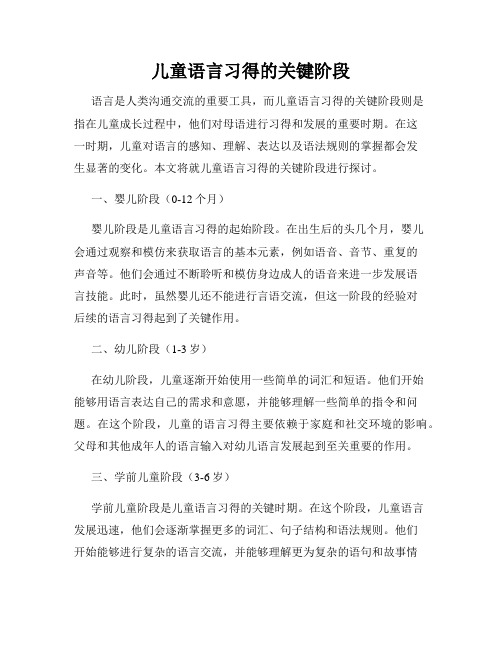
儿童语言习得的关键阶段语言是人类沟通交流的重要工具,而儿童语言习得的关键阶段则是指在儿童成长过程中,他们对母语进行习得和发展的重要时期。
在这一时期,儿童对语言的感知、理解、表达以及语法规则的掌握都会发生显著的变化。
本文将就儿童语言习得的关键阶段进行探讨。
一、婴儿阶段(0-12个月)婴儿阶段是儿童语言习得的起始阶段。
在出生后的头几个月,婴儿会通过观察和模仿来获取语言的基本元素,例如语音、音节、重复的声音等。
他们会通过不断聆听和模仿身边成人的语音来进一步发展语言技能。
此时,虽然婴儿还不能进行言语交流,但这一阶段的经验对后续的语言习得起到了关键作用。
二、幼儿阶段(1-3岁)在幼儿阶段,儿童逐渐开始使用一些简单的词汇和短语。
他们开始能够用语言表达自己的需求和意愿,并能够理解一些简单的指令和问题。
在这个阶段,儿童的语言习得主要依赖于家庭和社交环境的影响。
父母和其他成年人的语言输入对幼儿语言发展起到至关重要的作用。
三、学前儿童阶段(3-6岁)学前儿童阶段是儿童语言习得的关键时期。
在这个阶段,儿童语言发展迅速,他们会逐渐掌握更多的词汇、句子结构和语法规则。
他们开始能够进行复杂的语言交流,并能够理解更为复杂的语句和故事情节。
此时,儿童对语言的敏感期逐渐结束,语言的习得将变得更为困难。
四、学龄前儿童阶段(6-12岁)学龄前儿童阶段是儿童语言习得的最后一个关键阶段。
在这个阶段,儿童的语言能力得到了进一步的提高和发展。
他们能够运用更加复杂的语法结构和词汇来进行口语和书面表达,并能够理解和回答较为抽象和复杂的问题。
此时,学龄前儿童的语言发展取决于他们所接触到的语言环境、学习机会和语言输入的质量。
总结而言,儿童语言习得的关键阶段分为婴儿阶段、幼儿阶段、学前儿童阶段和学龄前儿童阶段。
每个阶段都有其独特的语言习得特点和需求。
家庭和社会环境对儿童语言发展起着重要作用,在这一过程中,家长和老师应该提供丰富的语言输入和良好的语言学习环境,以促进儿童语言习得的顺利进行。
语言习得理论

主要内容
语言习得的定义
儿童第一语言习得的基本过程
及理论解释
一、语言习得的定义
习得:儿童不自觉地自然地掌握母语的过 程和方法,儿童是通过大量接触语言在交 际中掌握语言,没有人专门教他,也没有 人刻意地纠正他的错误,不注重语言形式 而注重意义,语言规律的掌握是无意识的, 习得过程是由不自觉到自觉。我们常说第 一语言习得,儿童母语的习得。 学习:指在学校环境中,有意识地掌握第 二语言的过程和方式,它注重语言形式, 过程由自觉到不自觉,我们常说第二语言 学习。
② 相互作用论不是把语言本身看成是先天的 产物,而是在非语言的认知基础上构造出 来的,强调的是认知结构的动态的建构过 程,这一过程也适用于语言的获得。这对 于个体自发能动地获得语言成分、总结归 纳语言规则,创造性地建构话语做了合理 的解释。同时这种建构的能动性不是无限 地发挥,而是和认知发展有相互制约的关 系,因此表现为语言习得中的阶段性和顺 序,这些解释都是很有说服力的。
②单词句阶段:1岁至1岁半,真正学话,
一个词、单词话语。
③双词句阶段:1岁半,两个词语在一起
(一为轴心词,一为开放词)。
④电报句阶段:2岁半左右,实词句阶段。只用实
词,不用虚词。逐渐开始使用代词、介词、连 词、动词词尾、助动词等。
⑤成人句阶段:3岁半至5岁,初级阶段基本完成。 能意识到有一个规则体系,并能重复使用。开 始了解并掌握语言的社会功能。
2)先天论也受到不少批评:
①
首先这一理论是思辨的产物,无法证明儿 童头脑中是否存在语言习得机制,这只是 一种假说。有人说这是一个天才的假说, 人们既无法证明它,也无法否定它。 是否存在着普通语法,这也是一个争 论的问题,如果说儿童 一生下来头脑中 就有普遍语法的范畴和规则,很难解释儿 童后来学习语法要花那么多时间。很多人 接受先天学习语言能力,但不同意有普遍 语法。
儿童的语言习得过程
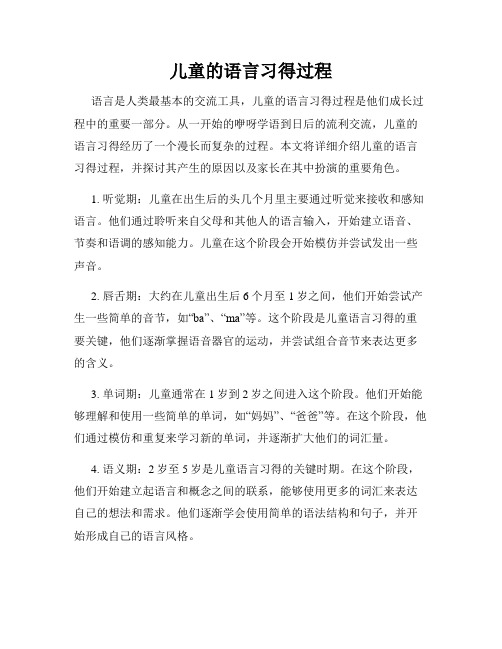
儿童的语言习得过程语言是人类最基本的交流工具,儿童的语言习得过程是他们成长过程中的重要一部分。
从一开始的咿呀学语到日后的流利交流,儿童的语言习得经历了一个漫长而复杂的过程。
本文将详细介绍儿童的语言习得过程,并探讨其产生的原因以及家长在其中扮演的重要角色。
1. 听觉期:儿童在出生后的头几个月里主要通过听觉来接收和感知语言。
他们通过聆听来自父母和其他人的语言输入,开始建立语音、节奏和语调的感知能力。
儿童在这个阶段会开始模仿并尝试发出一些声音。
2. 唇舌期:大约在儿童出生后6个月至1岁之间,他们开始尝试产生一些简单的音节,如“ba”、“ma”等。
这个阶段是儿童语言习得的重要关键,他们逐渐掌握语音器官的运动,并尝试组合音节来表达更多的含义。
3. 单词期:儿童通常在1岁到2岁之间进入这个阶段。
他们开始能够理解和使用一些简单的单词,如“妈妈”、“爸爸”等。
在这个阶段,他们通过模仿和重复来学习新的单词,并逐渐扩大他们的词汇量。
4. 语义期:2岁至5岁是儿童语言习得的关键时期。
在这个阶段,他们开始建立起语言和概念之间的联系,能够使用更多的词汇来表达自己的想法和需求。
他们逐渐学会使用简单的语法结构和句子,并开始形成自己的语言风格。
5. 句法期:大约在5岁至10岁之间,儿童开始学习和掌握更复杂的语法规则和句子结构。
他们能够理解并使用更多的语法概念和词汇,能够组织和表达更复杂的思想和观点。
儿童语言习得的过程是一个渐进的过程,长期而言,儿童的语言水平逐渐提高,并不断扩大他们的词汇量和语法知识。
这个过程受到多种因素的影响,包括遗传因素、环境影响和个体差异。
家长在儿童语言习得中扮演着重要的角色。
他们是儿童最主要的语言输入来源,他们的言语和交流方式对儿童的语言发展起着至关重要的作用。
家长可以通过与儿童的互动来促进他们的语言习得,比如与他们进行对话、朗读故事、唱歌和玩语言游戏等。
此外,家长还可以创造一个丰富的语言环境,提供多样化的语言资源,如图书、故事书和音频资料,以激发儿童的语言兴趣和学习动力。
语言习得理论4

2)先天论也受到不少批评:
①
首先这一理论是思辨的产物,无法证明儿 童头脑中是否存在语言习得机制,这只是 一种假说。有人说这是一个天才的假说, 人们既无法证明它,也无法否定它。 是否存在着普通语法,这也是一个争 论的问题,如果说儿童 一生下来头脑中 就有普遍语法的范畴和规则,很难解释儿 童后来学习语法要花那么多时间。很多人 接受先天学习语言能力,但不同意有普遍 语法。
③
3、认知论(先天与后天相互作论)
(1)理论基础 1)认知论以瑞士著名的儿 童心理学家皮亚杰的 “认知论”为理论基础, 认为儿童的语言发展是 天生的能力与客观的经 验相互作用的结果。儿 童的语言学习是建立在 儿童认知能力发展的基 础上的。
2)这种理论认为人类有一种先天的认知能力
(功能不变式),这种能力随着躯体内部 组织的成熟决定,与环境相互作用,并向 环境学习,作为向环境学习的结果,形成 了一定的“认知结构”。(认知图式)这 种“认知结构”随着儿童的发展而变化, 他的认知能力也不断从低级阶段向高一级 阶段发展。
⑤家庭和幼儿园语言环境的好坏直接影
响儿童的语言水平(缺乏语言交际 环境的儿童,语言发展的进程要比 正常儿童推迟一年多)。
2)刺激—反应论的不足:
①
言语行为十分复杂,既有可观察可测量的外部因素, 也很多难于观察、测量心理因素,不同于一般的动物 行为,不能只用“刺激-反应”来解释。外因论他们只 承认言语行为,不承认有复杂的符号系统的存在,把 言语混同于语言。他们看不到语言有复杂的内部结构 体系,言语行为受规则支配,把言语行为简单地等同 于其他行为,甚至等同于动物的行为,将动物的实验 结果简单地推广到儿童的语言学习中,强调刺激与反 应在直接情境中的固定的、机械的联系,否定了人的 语言潜能和言语行为的特殊性,否定大脑加工外部信 息的能动性,把主体当作被动消极的语言训练对象, 这不符合儿童习得语言的基本事实,因而不能解释实 际存在的许多问题。
儿童发展中的语言习得与认知发展的关系

儿童发展中的语言习得与认知发展的关系语言习得是儿童发展过程中至关重要的一部分,与儿童的认知发展密切相关。
无论是语言的词汇掌握、语法运用还是语言交流能力的提升,都与儿童的认知能力息息相关。
本文将探讨语言习得与认知发展之间的关系,并分析其对儿童全面发展的积极影响。
第一部分:儿童语言习得的阶段在儿童的语言习得中,有固定的发展阶段,其中包括婴儿期的语音感知与发音,幼儿期的词汇习得,以及学龄期的语法和语义的发展。
在这一过程中,儿童逐渐从简单的语音和词汇习得到复杂的语言表达能力的形成。
第二部分:儿童的认知发展过程认知发展是指儿童在认识和理解世界时逐渐形成的能力。
它包括感知、思维、记忆、注意力等方面的发展。
在幼儿期,儿童逐渐具备了逻辑思维和抽象推理的能力,这对语言习得起到了推动作用。
认知能力的发展不仅使儿童能够更好地理解语言,还能促进其语言表达和交流能力的提升。
第三部分:语言习得与认知发展的关系语言习得与认知发展之间存在着互动与影响。
首先,语言习得对认知发展具有促进作用。
通过学习语言,儿童能够更好地理解和处理信息,提高思维能力和注意力集中程度。
其次,认知发展也影响着语言习得的进程。
具有更高认知能力的儿童更容易把握语言的规律和逻辑,有利于词汇习得和语法掌握的提升。
第四部分:语言习得与认知发展的积极影响语言习得与认知发展的良性互动对儿童的全面发展具有积极影响。
首先,语言习得对儿童的认知能力有助于形成清晰、准确的思维方式,促进其思维活动的高效展开。
其次,认知发展对儿童的语言习得起到推动作用,儿童能更好地理解语言的含义,提高语言表达能力。
此外,良好的语言习得与认知发展也有助于儿童的社交能力和学习能力的提升。
结论部分综上所述,儿童发展中的语言习得与认知发展是相互关联、相互作用的。
语言习得促进了认知能力的发展,而认知能力的提升也推动了语言习得的进程。
良好的语言习得与认知发展对儿童的整体发展起着积极的作用。
因此,教育者和家长应重视儿童语言习得与认知发展的培养,为其提供良好的语言环境和适当的学习机会,以促进儿童全面发展。
- 1、下载文档前请自行甄别文档内容的完整性,平台不提供额外的编辑、内容补充、找答案等附加服务。
- 2、"仅部分预览"的文档,不可在线预览部分如存在完整性等问题,可反馈申请退款(可完整预览的文档不适用该条件!)。
- 3、如文档侵犯您的权益,请联系客服反馈,我们会尽快为您处理(人工客服工作时间:9:00-18:30)。
EXPLORINGPSYCHOLOGY(7th Edition)David MyersThinking, Language, & IntelligenceChapter 9Category HierarchiesWe organize concepts into category hierarchies.Development of ConceptsWe form some concepts with definitions. For example, a triangle has three sides. Mostly, we form concepts with mental images or typical examples (prototypes). For example, a robin is a prototype of a bird, but a penguin is not.Problem SolvingProblem solving strategies include:AlgorithmsHeuristicsInsightProblem solving strategies include:AlgorithmsAlgorithms, which are very time consuming, exhaust all possibilities before arriving at a solution. Computers use algorithms.HeuristicsHeuristics are simple, thinking strategies that allow us to make judgments and solve problems efficiently. Heuristics are less time consuming, but more error-prone than algorithms.HeuristicsHeuristics make it easier for us to use simple principles to arrive at solutions to problems. InsightInsight involves a sudden novel realization of a solution to a problem. Humans and animals have insight.Obstacles in Solving ProblemsConfirmation Bias: A tendency to search for information that confirms a personal bias. FixationFixation: An inability to see a problem from a fresh perspective. This impedes problem solving. An example of fixation is functional fixedness.The Matchstick Problem: SolutionMaking Decision & Forming JudgmentsEach day we make hundreds of judgments and decisions based on our intuition, seldom using systematic reasoning.The Effects of FramingDecisions and judgments may be significantly affected depending upon how an issue is framed.The Belief Perseverance PhenomenonBelief perseverance is the tendency to cling to our beliefs in the face of contrary evidence.Perils & Powers of IntuitionIntuition may be perilous if unchecked, but may also be extremely efficient and adaptive. When do we learn language?Babbling Stage: Beginning at 4 months, the infant spontaneously utters various sounds, like ah-goo. Babbling is not imitation of adult speech.When do we learn language?One-Word Stage: Beginning at or around his first birthday, a child starts to speak one word at a time and is able to make family members understand him. The word doggy may mean look at the dog out there.When do we learn language?Two-Word Stage: Before the 2nd year, a child starts to speak in two-word sentences. This form of speech is called telegraphic speech because the child speaks like a telegram: “Go car,” means I would like to go for a ride in the car.Explaining Language Development1.Operant Learning: Skinner (1957, 1985) believed that language development maybe explained on the basis of learning principles such as association, imitation, and reinforcement.Explaining Language DevelopmentInborn Universal Grammar: Chomsky (1959, 1987) opposed Skinner’s ideas and suggested that the rate of language acquisition is so fast that it cannot be explained through learning principles, and thus most of it is inborn.Explaining Language DevelopmentChildhood is a critical period for fully developing certain aspects of language. Children never exposed to any language (spoken or signed) by about age 7 gradually lose their ability to master any language.Language Influences ThinkingLinguistic Determinism: Whorf (1956) suggested that language determines the way we think. For example, he noted that the Hopi people do not have the past tense for verbs. Therefore, the Hopi cannot think readily about the past.Language Influences ThinkingWhen a language provides words for objects or events, we can think about these objects more clearly and remember them. It is easier to think about two colors with two different names (A) than colors with the same name (B) (Özgen, 2004).Thinking in ImagesTo a large extent thinking is language-based. When alone, we may talk to ourselves. However, we also think in images.Images and BrainImagining a physical activity activates the same brain regions as when actually performing the activity.Language and ThinkingTraffic runs both ways between language and thinking.Animal Thinking & LanguageDo animals have a language?Do Animals Think?InsightProblem SolvingAnimal CultureDo Animals Exhibit Language?There is no doubt that animals communicate.Vervet monkeys, whales and even honey bees communicate with members of their species and other species.Sign LanguageAmerican Sign Language (ASL) is instrumental in teaching chimpanzees a form of communication.The Case of ApesGardner and Gardner (1969) used American Sign Language (ASL) to train Washoe, a chimp, who learned 181 signs by the age of 32.Gestured CommunicationAnimals, like humans, exhibit communication through gestures. It is possible that vocal speech developed from gestures during the course of evolution.But Can Apes Really Talk?1.Apes acquire their limited vocabularies with a great deal of difficulty, unlikechildren who develop vocabularies at amazing rates.2.Chimpanzees can make signs to receive a reward, just as a pigeon who pecks atthe key receives a reward. However, pigeons have not learned a language.3.Chimpanzees use signs meaningfully but lack human syntax.4.Presented with ambiguous information, people tend to see what they want to see(perceptual set).Intelligence: Ability or Abilities? Have you ever thought that since people’s mental abilities are so diverse, it may not be justifiable to label those abilities with only one word, intelligence?General IntelligenceThe idea that general intelligence (g) exists comes from the work of Charles Spearman (1863-1945) who helped develop the factor analysis approach in statistics.General IntelligenceSpearman proposed that general intelligence (g) is linked to many clusters that can be analyzed by factor analysis.Contemporary Intelligence TheoriesHoward Gardner (1983, 1999) supports the idea that intelligence comes in multiple forms. Gardner notes that brain damage may diminish one type of ability but not others. Emotional IntelligenceEmotional intelligence is the ability to perceive, understand, and use emotions (Salovey and others, 2005). The test of emotional intelligence measures overall emotional intelligence and its four components.Emotional Intelligence: ComponentsComponent DescriptionPerceive emotion Recognize emotions in faces, music and storiesUnderstand emotion Predict emotions, how they change and blendManage emotion Express emotions in different situationsUse emotion Utilize emotions to adapt or be creativeAlfred BinetAlfred Binet and his colleague Théodore Simon practiced a more modern form of intelligence testing by developing questions that would predict children’s future progress in the Paris school system.Lewis TermanFormula of Intelligence Quotient (IQ), introduced by William Stern:Principles of Test ConstructionFor a psychological test to be acceptable it must fulfill the following three criteria: StandardizationReliabilityValidityStandardizationStandardizing a test involves administering the test to a representative sample of future test takers in order to establish a basis for meaningful comparisonNormal CurveStandardized tests establish a normal distribution of scores on a tested population in a bell-shaped pattern called the normal curve.ReliabilityA test is reliable when it yields consistent results. To establish reliability researchers establish different procedures:1.Split-half Reliability: Dividing the test into two equal halves and assessing howconsistent the scores are.2.Test-Retest Reliability: Using the same test on two occasions to measureconsistency.ValidityReliability of a test does not ensure validity. Validity of a test refers to what the test is supposed to measure.Extremes of IntelligenceA valid intelligence test divides two groups of people into two extremes: the mentally retarded (IQ 70) and individuals with high intelligence (IQ 135). These two groups are significantly different.High IntelligenceContrary to popular belief, people with high intelligence test scores tend to be healthy, well adjusted, and unusually successful academically.Mental RetardationMentally retarded individuals required constant supervision a few decades ago, but with a supportive family environment and special education they can now care for themselves.Flynn Effect: A MysteryIn the past 60 years, intelligence scores have risen steadily by an average of 27 points. This phenomenon is known as the Flynn effect.Genetic and Environmental Influences on IntelligenceNo other topic in psychology is so passionately followed as the one that asks the question, “Is intelligence due to genetics or environment?”Genetic InfluencesStudies of twins, family members, and adopted children together support the idea that there is a significant genetic contribution to intelligence.Adoption StudiesAdopted children show a marginal correlation in verbal ability to their adoptive parents. More correlation with birth parents as the children age.HeritabilityThe variation in intelligence test scores attributable to genetics. We credit heredity with 50% of the variation in intelligence.It pertains only to why people differ from one another, not to the individual.Early Intervention EffectsEarly neglect from caregivers leads children to develop a lack of personal control over the environment, and it impoverishes their intelligence.Environmental Influences on Intelligence:Early neglectPoor Nourishment in childhoodImpoverished (non-stimulating) environmentIn utero terrataginsDrug/alcohol abuse or accidentThis is a list of ?:•German measles•X-rays, other radiation, toxic chemicals•Sexually transmitted diseases•Metabolic effects of cigarette smoking•Alcohol•Drugs•Malnutrition--answer:-- can negatively affect prenatal developmentSchooling Effects Schooling is an experience that pays dividends, which is reflected in intelligence scores. Increased schooling correlates with higher intelligence scores.Environmental EffectsDifferences in intelligence among these groups are largely environmental, as if one environment is more fertile in developing these abilities than the other.1.Ethnic Similarities and Differences Racial groups differ in their averageintelligence scores.2.High-scoring people (and groups) are more likely to attain high levels ofeducation and income.The Question of BiasAptitude tests are necessarily biased in the sense that they are sensitive to performance differences caused by cultural differences.Gender Similarities and DifferencesThere are seven ways in which males and females differ in various abilities.1. Girls are better spellers2. Girls are verbally fluent and have large vocabularies3. Girls are better at locating objects4. Girls are more sensitive to touch, taste, and color5. Boys outnumber girls in counts of underachievement6. Boys outperform girls at math problem solving, butunder perform at math computation7. Women detect emotions more easily than men do。
